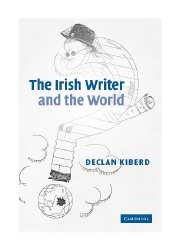Book contents
- Frontmatter
- Contents
- Acknowledgements
- A note on the text
- 1 Introduction
- 2 The fall of the Stage Irishman (1979)
- 3 Storytelling: the Gaelic tradition (1978)
- 4 Writers in quarantine? The case for Irish Studies (1979)
- 5 Synge, Yeats and bardic poetry (2002)
- 6 George Moore's Gaelic lawn party (1979)
- 7 The flowering tree: modern poetry in Irish (1989)
- 8 On national culture (2001)
- 9 White skins, black masks: Celticism and Négritude (1996)
- 10 From nationalism to liberation (1997)
- 11 The war against the past (1988)
- 12 The Elephant of Revolutionary Forgetfulness (1991)
- 13 Reinventing England (1999)
- 14 Museums and learning (2003)
- 15 Joyce's Ellmann, Ellmann's Joyce (1999)
- 16 Multiculturalism and artistic freedom: the strange death of Liberal Europe (1993)
- 17 The Celtic Tiger: a cultural history (2003)
- 18 The city in Irish culture (2002)
- 19 Strangers in their own country: multiculturalism in Ireland (2001)
- Index
- References
16 - Multiculturalism and artistic freedom: the strange death of Liberal Europe (1993)
Published online by Cambridge University Press: 22 September 2009
- Frontmatter
- Contents
- Acknowledgements
- A note on the text
- 1 Introduction
- 2 The fall of the Stage Irishman (1979)
- 3 Storytelling: the Gaelic tradition (1978)
- 4 Writers in quarantine? The case for Irish Studies (1979)
- 5 Synge, Yeats and bardic poetry (2002)
- 6 George Moore's Gaelic lawn party (1979)
- 7 The flowering tree: modern poetry in Irish (1989)
- 8 On national culture (2001)
- 9 White skins, black masks: Celticism and Négritude (1996)
- 10 From nationalism to liberation (1997)
- 11 The war against the past (1988)
- 12 The Elephant of Revolutionary Forgetfulness (1991)
- 13 Reinventing England (1999)
- 14 Museums and learning (2003)
- 15 Joyce's Ellmann, Ellmann's Joyce (1999)
- 16 Multiculturalism and artistic freedom: the strange death of Liberal Europe (1993)
- 17 The Celtic Tiger: a cultural history (2003)
- 18 The city in Irish culture (2002)
- 19 Strangers in their own country: multiculturalism in Ireland (2001)
- Index
- References
Summary
In 1991, a human corpse was used in a sculpture by an American artist; and another artist dipped a crucifix in a container filled with his own urine to make a model called Piss Christ. In 1990, the controversial photographs of the late Robert Mapplethorpe were exhibited, including depictions of one man stuffing his fist up another man's rectum. All of these cases provoked massive controversy, and they were part of a wider pattern of debate in the developed – some might say, overdeveloped – nations of the West. In February 1989, a British jury had ruled that the use of human foetuses as earrings in a work of art was an outrage to public decency. The ten-to-two majority, far from being seen as conclusive, provoked a new debate: should they have the right to dictate what can or cannot be enjoyed by the minority?
That question of a desirable balance between expressive freedom and the social order is as old as the law itself, but it has been posed with particular intensity in the past century, ever since art proclaimed itself the new religion and Matthew Arnold proclaimed that the place of the priests would now be taken by poets. The high modernists contended that life was justified as an aesthetic phenomenon, or else not at all. This led them to challenge bourgeois proprieties in a series of well-publicised contests, beginning when the Lord Chamberlain banned a performance of Wilde's Salomé in London in 1894, and culminating in the unbanning of Lady Chatterley's Lover after the famous trial of 1960.
- Type
- Chapter
- Information
- The Irish Writer and the World , pp. 250 - 268Publisher: Cambridge University PressPrint publication year: 2005



